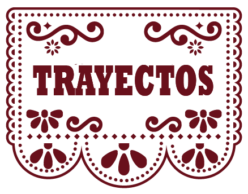
Trabaja con un@ compañer@ y practica tu español en estas situaciones sociales. You need to use the vocabulary and structures you learned in Módulo introductorio (e.g., saludos, el verbo ser, el verbo hay, question words) and in this module (e.g., -ar verbs, la hora y los días de la semana).
Conversación 1
Estudiante 1. Besides studying, your new roommate has a job at the university. You come back from your first day of classes, and you start a conversation with them.
Greet your roommate. Ask:
- Where they work.
- The days of the week and the hours they work.
- What classes they are taking this semester.
Answer your roommate’s questions.
Estudiante 2. Your new roommate has come back from their first day of classes. They start a conversation with you. Greet your roommate, answer their questions, and also ask:
- What classes they are taking this semester.
- The days of the week and the times when they take classes.
- What their favorite class is.
- What they need for their classes.
Conversación 2
Estudiante 1. You have just met your new roommate. You ask questions to find out what they are like:
- Greet your roommate.
- Ask their name.
- Say where you are from, and how old you are (Tengo… años).
- Answer your roommate’s questions. Ask them similar questions.
Estudiante 2. You have just met your new roommate. You ask questions to find out what they are like:
- Greet your roommate. Answer your roommate’s question, and ask a related question.
- Say where you are from, and how old you are (Tengo… años).
- Tell what you are studying at the university and, specifically, the classes you are taking.
- Ask your roommate what they study, and what classes they are taking this semester.
- Answer your roommate’s question, and ask a related question.
Conversación 3
Estudiante 1. Imagine that this is your first semester studying at the Universidad de Málaga in Spain. You meet with a consejero/a (academic advisor) to talk about your classes, routine at the university, etc. Since this is a formal meeting, remember to use the “usted” forms in your conversation:
- Introduce yourself.
- Answer the consejero/a’s question, and say how old you are (Tengo… años).
- Ask questions about what classes you need to take, at what time they are, when they are (days of the week, etc.).
- Also, ask who the instructors of the courses are and what they are like.
- Answer your advisor’s questions.
Estudiante 2. Imagine that you are a consejero/a (academic advisor) at the Universidad de Málaga in Spain. You meet with a new student. Get as much information as possible about this person. Since this is a formal meeting, remember to use the “usted” forms in your conversation:
- Introduce yourself, and say where you are from.
- Find out where the student is from.
- Ask about routines and major (e.g., if they work, where, what their major [su especialización] is, etc.).
- Tell the student which classes they need to take, and answer the student’s questions.
Conversación 4
Estudiante 1. You and your roommate are discussing your classes. You need to add a history class. Your roommate is in a class that looks promising. Ask:
- Who the professor is.
- Ask them what the professor is like (use the appropriate gender form based on your roommate’s answer).
- Where the class is.
- If there is a lot of homework.
- When and at what time the class meets.
- How many exams there are in the class.
Estudiante 2. You and your roommate are discussing your classes. You want to know more about your roommate’s schedule, and they have questions for you too. Answer their questions and ask:
- How many classes they are taking.
- On what days they take classes.
- Where they are working this semester.
- Where they study.
- What time they study.
Now it’s time to synthesize and apply everything we have learned in this module. Let’s go to

